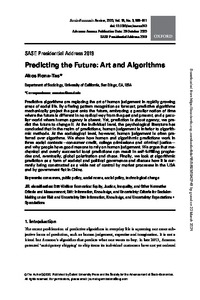Predicting the future: art and algorithms

2020
18
3
July
893-911
artificial intelligence ; technological change ; future ; forecast ; social sciences
Technology
https://doi.org/10.1093/ser/mwaa040
English
Bibliogr.
"Predictive algorithms are replacing the art of human judgement in rapidly growing areas of social life. By offering pattern recognition as forecast, predictive algorithms mechanically project the past onto the future, embracing a peculiar notion of time where the future is different in no radical way from the past and present, and a peculiar world where human agency is absent. Yet, prediction is about agency, we predict the future to change it. At the individual level, the psychological literature has concluded that in the realm of predictions, human judgement is inferior to algorithmic methods. At the sociological level, however, human judgement is often preferred over algorthms. We show how human and algorithmic predictions work in three social contexts—consumer credit, college admissions and criminal justice—and why people have good reasons to rely on human judgement. We argue that mechanical and overly successful local predictions can result in self-fulfilling prophecies and, eventually, global polarization and chaos. Finally, we look at algorithmic prediction as a form of societal and political governance and discuss how it is currently being constructed as a wide net of control by market processes in the USA and by government fiat in China."
Digital
The ETUI is co-funded by the European Union. Views and opinions expressed are however those of the author(s) only and do not necessarily reflect those of the European Union or the ETUI.